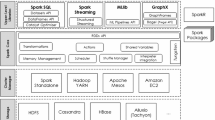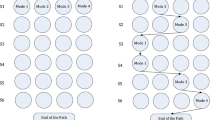Abstract
Grid computing is a framework for large-scale resource sharing and indexing that evolves with the goal of resource provisioning. In this paper, we develop a distributed learning automata (DLA) based on multi-swarm discrete particle swarm optimization (PSO) approach for Grid resource discovery, called distributed optimization grid (DOG) resource discovery algorithm. This algorithm makes use of swarms of particles for different computational resource metrics while a group of DLA is the control unit of each swarm of particles. The algorithm takes advantage of the PSO solution diversity to optimize the quality of delivered resource. Moreover, the recommended algorithm uses DLA as a fully distributed model for imitating the Grid infrastructure topology. Our experimental results show that DOG is fast as well as efficient and accurate.









Similar content being viewed by others
References
Czajkowski K, Fitzgerald S, Foster I, Kesselman C (2001) Grid information services for distributed resource sharing. In: Proceedings of the 10th IEEE international symposium on high performance distributed computing, pp 181–194
Keung HNLC, Dyson JRD, Jarvis SA, Nudd GR (2003) Performance evaluation of a grid resource monitoring and discovery service. Softw IEE Proc 150(4):243–251
Aloisio G, Cafaro M, Epicoco I, Fiore S, Lezzi D, Mirto M, Mocavero S (2005) iGrid, a novel grid information service. In: Advances in grid computing-EGC. Springer, Berlin, pp 506–515
Mirto M, Cafaro M, Aloisio G (2013) Peer-to-peer data discovery in health centers. In: 2013 IEEE 26th international symposium on computer-based medical systems (CBMS), pp 343–348
Foster I, Kesselman C (1997) Globus: a metacomputing infrastructure toolkit. Int J High Perform Comput Appl 11(2):115–128
Li C, Li L (2012) A resource selection scheme for QoS satisfaction and load balancing in ad hoc grid. J Supercomput 59(1):499–525
Ranjan R, Harwood A, Buyya R (2012) Coordinated load management in Peer-to-Peer coupled federated grid systems. J Supercomput 61(2):292–316
Chung W-C, Hsu C-J, Lai K-C, Li K-C, Chung Y-C (2013) Direction-aware resource discovery in large-scale distributed computing environments. J Supercomput 66(1):229–248
Ergu D, Kou G, Peng Y, Shi Y, Shi Y (2013) The analytic hierarchy process: task scheduling and resource allocation in cloud computing environment. J Supercomput 64(3):835–848
Adabi S, Movaghar A, Rahmani AM, Beigy H (2013) Negotiation strategies considering market, time and behavior functions for resource allocation in computational grid. J Supercomput 66(3):1350–1389
Narendra KS, Thathachar M (1974) Learning Automata?: a survey. IEEE Trans Syst Man Cybern SMC (4):323–334
Beigy H, Meybodi MR (2006) Utilizing distributed learning automata to solve stochastic shortest path problems. Int J Uncertain FUZZINESS Knowl BASED Syst 14(5):591
Kennedy J (2010) Particle swarm optimization. In: Encyclopedia of machine learning. Springer, Berlin, pp 760–766
Mohamadi H, Ismail AS, Salleh S, Nodhei A (2013) Learning automata-based algorithms for finding cover sets in wireless sensor networks. J Supercomput 66(3):1533–1552
Piwonska A, Seredynski F, Szaban M (2013) Learning cellular automata rules for binary classification problem. J Supercomput 63(3):800–815
Misra S, Krishna PV, Bhiwal A, Chawla AS, Wolfinger BE, Lee C (2012) A learning automata-based fault-tolerant routing algorithm for mobile ad hoc networks. J Supercomput 62(1):4–23
Mozafari M, Alizadeh R (2013) A cellular learning automata model of investment behavior in the stock market. Neurocomputing 122:470–479
Hasanzadeh M, Meybodi MR (2013) Grid resource discovery based on distributed learning automata. Computing 96(9):909–922
Ghanbari S, Meybodi MR (2005) On-line mapping algorithms in highly heterogeneous computational grids: a learning automata approach. In: International conference on information and knowledge technology (IKT’05), vol 67
Pooranian Z, Shojafar M, Abawajy JH, Abraham A (2013) An efficient meta-heuristic algorithm for grid computing. J Comb Optim 1–22. doi:10.1007/s10878-013-9644-6
Huang D, Yuan Y, Zhang L, Zhao K (2009) Research on tasks scheduling algorithms for dynamic and uncertain computing grid based on a+ bi connection number of SPA. J Softw 4(10):1102–1109
Kashyap R, Vidyarthi DP (2013) Security driven scheduling model for computational grid using NSGA-II. J Grid Comput 11(4):721–734
Jacob B, I. B. M. C. I. T. S. Organization, S. B. O. (Firme) (2005) Introduction to grid computing. IBM, International Technical Support Organization
Trunfio P, Talia D, Papadakis H, Fragopoulou P, Mordacchini M, Pennanen M, Popov K, Vlassov V, Haridi S (2007) Peer-to-Peer resource discovery in Grids: models and systems. Future Gener Comput Syst 23(7):864–878
Iamnitchi A, Foster I (2001) On fully decentralized resource discovery in grid environments. In: Lee C (ed) Grid computing—GRID 2001, vol 2242. Springer, Berlin, pp 51–62
Iamnitchi A, Foster I, Nurmi DC (2003) A peer-to-peer approach to resource location in grid environments. In: International series in operations research and management science, pp 413–430
Tangpongprasit S, Katagiri T, Kise K, Honda H, Yuba T (2005) A time-to-live based reservation algorithm on fully decentralized resource discovery in Grid computing. Parallel Comput 31(6):529–543
Noghabi HB, Ismail AS, Ahmed AA, Khodaei M (2012) Optimized query forwarding for resource discovery in unstructured peer-to-peer grids. Cybern Syst 43(8):687–703
Campos J, Esteva M, López-Sánchez M, Morales J, Salamó M (2011) Organisational adaptation of multi-agent systems in a peer-to-peer scenario. Computing 91(2):169–215
Deng Y, Wang F, Ciura A (2009) Ant colony optimization inspired resource discovery in P2P Grid systems. J Supercomput 49(1):4–21
Brocco A, Malatras A, Hirsbrunner B (2010) Enabling efficient information discovery in a self-structured grid. Future Gener Comput Syst 26(6):838–846
Beverly Yang B, Garcia-Molina H (2003) Designing a super-peer network. In: Proceedings of the 19th international conference on data engineering, pp 49–60
Mastroianni C, Talia D, Verta O (2008) Designing an information system for Grids: comparing hierarchical, decentralized P2P and super-peer models. Parallel Comput 34(10):593–611
Hasanzadeh M, Meybodi MR, Ebadzadeh MM (2013) Adaptive cooperative particle swarm optimizer. Appl Intell 39(2):397–420
Hashemi AB, Meybodi MR (2011) A note on the learning automata based algorithms for adaptive parameter selection in PSO. Appl Soft Comput 11(1):689–705
Vafashoar R, Meybodi MR, Momeni Azandaryani AH (2011) CLA-DE: a hybrid model based on cellular learning automata for numerical optimization. Appl Intell 36(3):735–748
Esnaashari M, Meybodi MR (2013) Deployment of a mobile wireless sensor network with k-coverage constraint: a cellular learning automata approach. Wirel Netw 19(5):945–968
Shojafar M, Pooranian Z, Meybodi MR, Singhal M (2013) ALATO: an efficient intelligent algorithm for time optimization in an economic grid based on adaptive stochastic Petri net. J Intell Manuf 1–18. doi:10.1007/s10845-013-0824-0
Thathachar M (1987) Learning automata with changing number of actions. IEEE Trans Syst Man Cybern 17(6):1095–1100
Akbari Torkestani J, Meybodi MR (2010) An intelligent backbone formation algorithm for wireless ad hoc networks based on distributed learning automata. Comput Netw 54(5):826–843
Forsati R, Meybodi MR (2010) Effective page recommendation algorithms based on distributed learning automata and weighted association rules. Expert Syst Appl 37(2):1316–1330
Sharma B, Thulasiram RK, Thulasiraman P (2013) Normalized particle swarm optimization for complex chooser option pricing on graphics processing unit. J Supercomput 66(1):170–192
Toumi L, Moussaoui A, Ugur A (2014) Particle swarm optimization for bitmap join indexes selection problem in data warehouses. J Supercomput 68(2):672–708
Garg R, Singh AK (2013) Multi-objective workflow grid scheduling using \(\varepsilon \)-fuzzy dominance sort based discrete particle swarm optimization. J Supercomput 68(2):709–732
Kennedy J, Eberhart RC (1997) A discrete binary version of the particle swarm algorithm. In: 1997 IEEE International conference on systems, man, and cybernetics. Computational cybernetics and simulation, vol 5, pp 4104–4108
Rastegar R, Meybodi MR, Badie K (2004) A new discrete binary particle swarm optimization based on learning automata. In: Proceedings of the 2004 international conference on machine learning and applications, pp 456–462
Buyya R, Murshed M (2002) Gridsim: a toolkit for the modeling and simulation of distributed resource management and scheduling for grid computing. Concurr Comput Pract Exp 14(13–15):1175–1220
Jeanvoine E, Morin C (2008) RW-OGS: an optimized randomwalk protocol for resource discovery in large scale dynamic Grids. In: Proceedings of the 2008 9th IEEE/ACM international conference on grid computing, Washington, DC, USA, pp 168–175
Dimakopoulos VV, Pitoura E (2006) On the performance of flooding-based resource discovery. IEEE Trans Parallel Distrib Syst 17(11):1242–1252
Oommen BJ (2010) Recent advances in learning Automata systems. In: 2010 2nd international conference on computer engineering and technology (ICCET), vol 1. pp V1–724
Author information
Authors and Affiliations
Corresponding author
Rights and permissions
About this article
Cite this article
Hasanzadeh, M., Meybodi, M.R. Distributed optimization Grid resource discovery. J Supercomput 71, 87–120 (2015). https://doi.org/10.1007/s11227-014-1289-4
Published:
Issue Date:
DOI: https://doi.org/10.1007/s11227-014-1289-4




